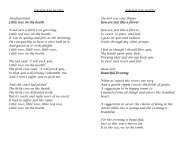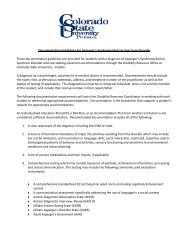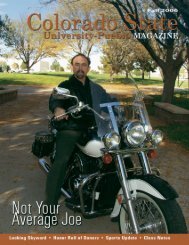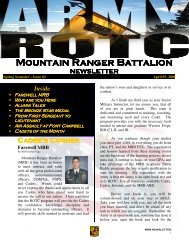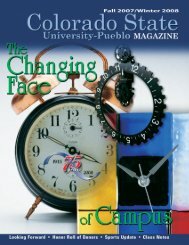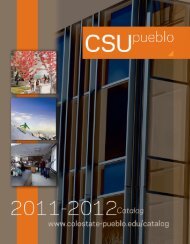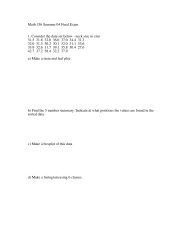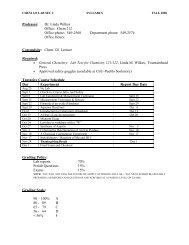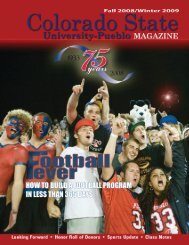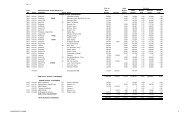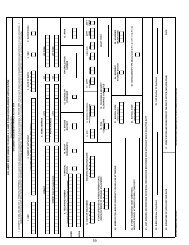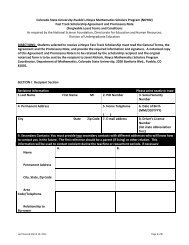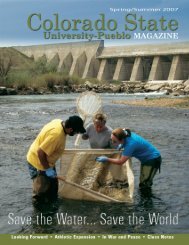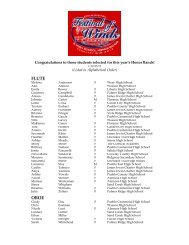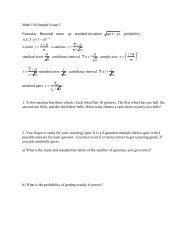2007-2008 Catalog (PDF) - Colorado State University-Pueblo
2007-2008 Catalog (PDF) - Colorado State University-Pueblo
2007-2008 Catalog (PDF) - Colorado State University-Pueblo
Create successful ePaper yourself
Turn your PDF publications into a flip-book with our unique Google optimized e-Paper software.
Academic Policies<br />
Retroactive Withdrawal<br />
Undergraduate students may request that all grades in<br />
previous semesters be retroactively removed and<br />
replaced by entries of W on the transcript if they have<br />
experienced, during that term, health and/or personal<br />
problems so severe that they could not reasonably<br />
have been expected to complete the semester<br />
satisfactorily. The requests must be submitted with<br />
documentation to the Associate Director of Records.<br />
Appropriate documentation should include direct<br />
information from a professional who can attest to the<br />
student’s claim of illness or legal issues and speak<br />
clearly to the difficulty that was encountered by the<br />
student. If a student chooses not to share such<br />
information, the Student Academic Appeals Board<br />
should decide the case based on the information<br />
available.<br />
Retroactive withdrawal applies to every course for a<br />
particular term and not for selective courses during a<br />
term.<br />
Military Withdrawal<br />
If military obligations interrupt the academic work of a<br />
member of the armed forces registered for courses,<br />
the student may ask instructors for an early termination<br />
of his or her courses. Early terminations may include,<br />
but are not limited to: 1) a grade of W; 2) an incomplete<br />
(IN) grade, if there is any chance the student will<br />
be able to complete the course requirements; 3) an<br />
early final examination and course grade; 4) partial<br />
course credit; or 5) an opportunity to complete the<br />
class by independent study. It is the student’s<br />
responsibility to make such a request in writing to the<br />
instructor. After the student and instructor have agreed<br />
on the terms of early termination, the agreement must<br />
be approved in writing by the department chair and the<br />
dean.<br />
EXPERIENTIAL CREDIT COURSES<br />
Through cooperative education, internships, field<br />
experiences and laboratory research, students in many<br />
degree programs have the opportunity to expand<br />
knowledge and apply theory in real-life situations. All<br />
experiential credit courses occur under the direction of<br />
an academic instructor and are included in the regular<br />
<strong>University</strong> curriculum. In some cases, such courses<br />
are required for majors. All such courses require<br />
registration, payment of tuition, carry credit, are listed<br />
in the catalog and include a planned program of<br />
activities outlined in the course syllabus. The grading<br />
system is the same as the system used for regular<br />
courses. Supervised work-experience courses are<br />
approved for inclusion in veteran’s class schedules<br />
under Veterans Administration Regulation 14265.<br />
Credit for Life Experience<br />
Some students may seek academic credit for previous<br />
out-of-school work experiences in which the job<br />
responsibilities were similar to experiences offered in<br />
<strong>University</strong>-sponsored internships and other programs.<br />
Credit for such experiences may be given if the<br />
following conditions are met:<br />
1) The experience must be directly similar to the<br />
content of internships, field courses and/or<br />
laboratory courses in the regular curriculum;<br />
2) The student must describe in writing the nature of<br />
the experience and what he or she learned<br />
through it;<br />
3) The experience and learning also must be<br />
documented by the student’s on-the-job supervisor.<br />
Documentation must include a detailed<br />
account of the nature, frequency and duration of<br />
the duties; and<br />
4) A paper integrating the experiences with subsequent<br />
or concurrent classroom instruction must be<br />
submitted and approved.<br />
The maximum number of credit hours allowed for life<br />
experiences is six. Any amount over six must be<br />
approved and justified by the appropriate dean to the<br />
provost. Credit for life experiences is granted only for<br />
experience gained within 12-years from the date the<br />
degree is expected to be awarded. Credit for life<br />
experiences is subject to the approval of the department<br />
chair and the dean of the college in which credit<br />
is requested.<br />
CHANGE OF MAJOR<br />
All changes of major must be made through the<br />
Records Office with the approval of the appropriate<br />
advisor/chair.<br />
CLASS ATTENDANCE<br />
Students are expected to attend all classes for which<br />
they are enrolled unless excused by the instructor. No<br />
extensions of vacation periods are given to students<br />
regardless of the location of their homes. Nonattendance<br />
of classes caused by late registration is<br />
considered the same as absence. Students are not<br />
allowed to attend classes for which they are not<br />
properly enrolled unless permitted by the instructor.<br />
47



